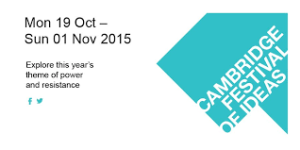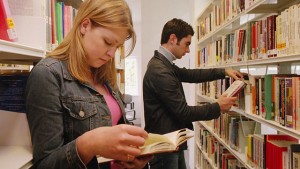The second series of my Close Reading feature on BBC Radio 4’s Open Book has kicked off in 2016 with two readings of novels about as different as can be. In the first episode, I try to figure out if you can close read comedy without taking all the fun out of it – my case study is Stella Gibbons’ comic classic, Cold Comfort Farm. In stark contrast, in the second episode, I take on J. M. Coetzee’s disturbing novel Disgrace, looking at how point of view in the narration of a rape reveals the ideas about complicity and denial at the heart of the novel. The series will continue over the next 6 months with episodes on Raymond Chandler’s The Big Sleep and Toni Morrison’s Beloved next in line. If you want to catch up with episodes from Series 1, they’re all gathered together on my BBC Close Reads page.
Since the first Series, I’ve had lots of conversations with people about close reading and why I believe it’s such an important way to approach literary texts both inside and outside the academy. So I thought with the launch of the second series it might be a good time for a blog making my case…
When I turned 16 my Dad gave me a copy of The Collected Dorothy Parker and I fell in love. She’s just brilliant. Parker’s very well known on the other side of the Atlantic, but not so much over here. When I introduce her to people I describe her as a kind of American Oscar Wilde. She’s very funny, darkly so. She’s perhaps most famous for her aphorisms that slip off the tongue but slice their targets – the one I always remember is ‘That woman speaks eighteen languages and can’t say “No” in any of them’.
Parker’s writing, like Wilde’s, is perfect, shinny, and smooth. What we see in it is a brutally honest reflection of ourselves and our societies. So she’s a very interesting example in relation to close reading. Because close reading requires depth. In any first reading, you skip along the surface, you’re drawn in by the plot, the emotion, the characters. You read quickly and you are absorbed. If a book doesn’t do that to you, it’s not working. And many people, to be fair, are happy to stop there. But I don’t think everybody is, or at least not all the time. And don’t think it’s just academics or students that want or need to know more, that say, ‘Hold on – this book’s made me laugh, or made me cry, or kept me riveted all night when I should have been asleep. How did it do that? How did words, just words, make me feel like that?’.
And that’s where close reading kicks in. You go back, and you go slowly. You look at just one passage, sometimes even just one line. And you get everything you can out of it. Which words have been chosen – why those exact ones not other ones? How have they been put together? Is there repetition? Is there emphasis? Who’s speaking? Whose thoughts do we have access to? There’s almost no end of these type of questions. But if you ask them, if you keep asking them, at some point, there’s this kind of moment, like twisting a kaleidoscope, when you see the pattern. And that moment is like discovering how a magic trick’s done. Suddenly, you understand, or at least you start to understand, how the book made you feel the way it did. And, even more importantly, you understand how the smallest detail is connected to the largest theme. And that’s really exciting. The book takes shape for you in a way that it hasn’t done before. Close reading exposes its workings – it’s like seeing a really complex clockwork mechanism with the front taken off. But that doesn’t ruin it for me. Because you don’t stop there. You go back and read for a third time and on that reading you’ve got the combination of the speed of the first reading, and the insight of the depth of the second close reading. And that third reading is something truly special.
‘A third reading?!’ I hear you exclaim in disbelief. Yes, why not. I know we’re all busy, that our lives are scheduled from morning to night. But that’s another reason why close reading’s important – it’s almost a kind of political act. It stands against the urgent speed and constant movement of contemporary life. It says no, there is power, there is benefit in going slowly, in reading closely and carefully. When Ali Smith was on Open Book in September 2014, she made exactly that plea for her own work – take time with it, she said, and it will nourish you.
Close reading also nourishes the writer, because it gives credit where credit is due. Just like magicians, writers don’t really want you to see the labour that’s gone into their work – it wouldn’t be enjoyable, it wouldn’t be working its magic, if you could. Ernest Hemingway said ‘it’s none of their business that you have to learn to write. Let them think you were born that way’. But at the same time writers actually do want you to know that – because they work really hard to get their prose just right, to get the exact effect they’re aiming for. Dorothy Parker’s prose for instance, shows no sign of effort, but in fact she edited and edited to get it that way: ‘I can’t write five words but that I change seven’ she said. Close reading is a compliment to writers – it’s saying, ‘You spent time on this, so I’m going to spend time on it too’. And that’s pleasurable and rewarding for both readers and writers.




